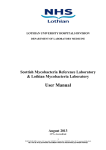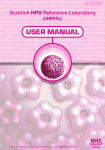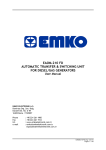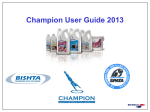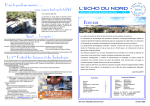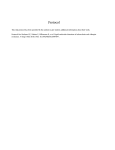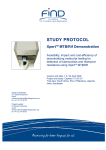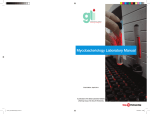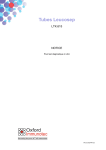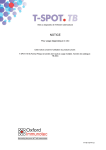Download User Manual - Scotland's Health on the Web
Transcript
Document No. SMRL-65 Version No. Review date 6.0 31/03/2017 LOTHIAN UNIVERSITY HOSPITALS DIVISION DEPARTMENT OF LABORATORY MEDICINE Scottish Mycobacteria Reference Laboratory & NHS Lothian Mycobacteria Laboratory User Manual Authors: Dr I.F. Laurenson & Mike Smith Scottish Microbiology Reference Laboratories, Edinburgh: http://www.edinburghlabmed.co.uk/Specialities/reflab/Pages/default.aspx NB: THIS IS AN ELECTRONIC DOCUMENT WHICH IS UNCONTROLLED WHEN PRINTED Authority for Issue : Mike Smith Page 1 of 18 Document No. SMRL-65 Version No. Review date 6.0 31/03/2017 August 2013 CPA Accredited INDEX Scottish Mycobacteria Reference Laboratory ............................................................................ 3 Telephone and Email Enquiries .................................................................................................. 3 Core Hours .................................................................................................................................. 3 Contact List ................................................................................................................................ 4 Packing and Transport of Infectious Substances ........................................................................ 5 Levels of Service ........................................................................................................................ 6 Samples for Mycobacterial Investigations ................................................................................. 6 Sample Types and Containers for Mycobacteria Investigation .................................................. 9 Tests Available, Turn Around Times and Costs ...................................................................... 10 Molecular Detection of Mycobacteria in Specimens ............................................................... 12 Reporting of Results ................................................................................................................. 12 Technical, Scientific and Health and Safety Advice ................................................................ 14 Clinical, Epidemiological and Infection Control Advice ......................................................... 14 Training and Education ............................................................................................................ 14 Research and Audit ................................................................................................................... 15 Quality Assurance .................................................................................................................... 15 Antimicrobial Assays ............................................................................................................... 16 Leprosy Diagnosis .................................................................................................................... 17 SCOTTISH MYCOBACTERIA REFERENCE LABORATORY – FORM .......................... 18 Authority for Issue : Mike Smith Page 2 of 18 Document No. SMRL-65 Version No. Review date 6.0 31/03/2017 Scottish Mycobacteria Reference Laboratory The Scottish Mycobacteria Reference Laboratory (SMRL) is the Scottish Reference Laboratory for Mycobacteriology, particularly for the identification, drug susceptibility testing and strain typing of Mycobacterium tuberculosis complex (MTBC) and non-tuberculous mycobacteria (NTM). The laboratory receives approximately 1,000 mycobacterial cultures per year mainly from Scottish NHS laboratories. The service is also funded to perform rapid detection of mycobacteria and screening for drug resistance on acid-fast bacillus (AFB) smear positive respiratory samples. Further advice is also available as detailed on page 13 & 14. The laboratory is based within the Royal Infirmary of Edinburgh, Little France Crescent, Edinburgh, EH16 4SA. It is fully integrated with the combined laboratories of the University Hospitals Division of NHS Lothian. SMRL is funded through an agreement between National Service Scotland and NHS Lothian University Hospitals Division. Some services have been developed which are available at a charge to the user. This manual covers three levels of service: 1. National Reference services funded by National Services Scotland (NSS). 2. Services paid for by charging the users per test. 3. Services provided by NHS Lothian to the local and other Boards by Service Level Agreement. These Boards are currently, NHS Borders, NHS Fife, NHS Dumfries and Galloway, NHS Highland, NHS Forth Valley and NHS Tayside. Telephone and Email Enquiries TB Laboratory Tel: 0131 242 6022/23 TB Office Tel: 0131 242 6016 mailto:[email protected] Fax machines are not considered a safe method of transmitting sensitive information; therefore, fax machines across NHS Lothian have or are in the process of being removed. Current fax number: 0131 242 6008 Core Hours The core laboratory hours are 9am to 5pm, Monday to Friday, but not weekends, Christmas and New Year holidays. At other times, Lothian laboratory users can discuss urgent AFB microscopy via the Consultant/Specialist Registrar on-call for clinical bacteriology (contact Royal Infirmary of Edinburgh switchboard Tel: 0131 536 1000). There is no out-of-hours AFB screening or Reference Laboratory service. For urgent enquiries out-of-hours, the on call Consultant Microbiologist may be contacted through the RIE switchboard (Tel 0131 536 1000) in the first instance. Authority for Issue : Mike Smith Page 3 of 18 Document No. SMRL-65 Version No. Review date 6.0 31/03/2017 Contact List Name and Designation Mrs Shona Hannan Reference Laboratory Administrator Telephone Numbers and e-mail Address Tel 0131 242 6016 [email protected] Dr Ian Laurenson Director Tel: 0131 242 6079 [email protected] Dr Ewan Olson Deputy Director Tel: 0131 242 6072 [email protected] Mr Mike Smith BMS Team Manager Tel: 0131 242 6009 [email protected] Mrs Pauline Claxton BMS Section Manager Tel: 0131 242 6009 [email protected] Mrs Christine Doig BMS Section Manager Tel: 0131 242 6009 [email protected] BMS Specialists Mr Gary Davidson Mr Lukman Elabor Mrs Fiona Mathewson Ms Sandra Houston Tel: 0131 242 6022/6023 Mr Neil McMinn MTO Mrs Jane Greig Advanced BSW Dr Louise Seagar Clinical Scientist Tel: 0131 242 6009 [email protected] The service is managed overall by NHS Lothian. If we are unable to deal with an issue and you wish to discuss a matter with NHS Lothian Management then contact: Linda Mulhern Tel: 0131 242 6017 mailto:[email protected] Operational Science Manager, Microbiology, NHS Lothian Mr Ian King Tel: 0131 242 7051 mailto:[email protected] Healthcare Science Manager, Cell Sciences, NHS Lothian. Authority for Issue : Mike Smith Page 4 of 18 Document No. SMRL-65 Version No. Review date 6.0 31/03/2017 Packing and Transport of Infectious Substances Postal Address DX Address Scottish Mycobacteria Reference Laboratory Department of Laboratory Medicine Royal Infirmary of Edinburgh 51 Little France Crescent Old Dalkeith Road Edinburgh EH16 4SA Exchange: Edinburgh 96 EH DX Number: DX6231201 NB Infectious substances may only be transported in packaging, which meets the U.N. Class 6.2 specifications and the 602 packing requirements. All Cultures must be sent by Hays DX Courier or equivalent-NOT by post. They must conform with the Transport of Dangerous Goods Act. Cultures for ‘routine’ processing should not usually be sent in batches. Packaging Mycobacteria Cultures or Samples: 1. Remove any water of condensation from the solid culture vial(s) - taking normal safety precautions for handling cultures. 2. Seal the cap with ‘parafilm’. 3. Wrap individual vials in sufficient absorbent material to absorb all the liquid in the vial and to protect it from breakage. 4. Seal this package twice in plastic bags. For posting by Hays DX courier for all cultures- preferred for specimens: 1. Place the sealed specimen bag into a screw-cap container from a DX box and put with it the corresponding request forms. 2. Carefully place the destination address label provided on the green tracking label on the package taking care not to cover any of the peel-off barcodes or tracking numbers. Also leave some space next to the lines for receiver’s Hays DX number and Exchange code. Place some clear selotape over the label to ensure it is not easily removed or damaged by rain, again avoiding covering any peel-off labels. 3. Fill in the Hays DX number and Exchange code of the destination. 4. Peel off one of the two matching tracking numbers at the bottom of the Tracked Specimen label and stick it in the provided Hays DX logbook and fill in the receiver’s details and date of dispatch. 5. At the top of the Hays DX label, fill in the sender’s name, sender’s Hays DX number, sender’s exchange code and the name and contact number for the sender. This information is written on a separate card at the front of the Hays DX logbook, 6. Place the provided blue security seal sticker over the package closure and dispatch. For posting by First Class Post (Samples Only): 1. Place the wrapped sample inside the inner container of the packaging and tighten the lid. 2. Place the inner container into the outer cardboard box. 3. Close the box and secure with tape. 4. Stick address label on the top of the box. 5. Stick “From” label, with senders address, on the bottom of the box 6. Post by First Class Post or courier such as DX for samples. Authority for Issue : Mike Smith Page 5 of 18 Document No. SMRL-65 Version No. Review date 6.0 31/03/2017 Levels of Service 1. National Services Scotland funded Remit SMRL receives cultures of presumed mycobacteria from all NHS laboratories in Scotland. These cultures are tested to determine • Presence of mycobacteria. • Full species identification. • Susceptibility to standard anti-mycobacterial drugs. • Susceptibility to second line anti-mycobacterial drugs where appropriate. • Rapid liquid culture of smear positive respiratory samples. • Molecular typing and comparison of M. tuberculosis complex strains. • Use of molecular tests on smear positive respiratory samples to rapidly identify the presence of mycobacteria and screen for drug resistance in M.tuberculosis complex. 2. Services available by charging users. • • • • Rapid liquid culture of samples from normally sterile sites (e.g. CSF, bone marrow, tissue samples, aspirates and bronchoalveolar lavage samples). Molecular tests on smear negative samples and smear positive non-respiratory samples. Culture of smear negative samples. PCR for molecular detection of MTB complex in fixed paraffin sections. 3. Services available by contract between requesting service and NHS Lothian • Processing of routine samples from patients for mycobacteria investigation. Samples for Mycobacterial Investigations 1. Microscopy All samples except blood, swabs and urine are routinely examined for direct AFB microscopy (provided there is sufficient specimen). 2. Culture Our current practice is to inoculate all specimens into liquid and solid media. 3. Drug susceptibility testing Susceptibilities are routinely performed on the first isolate from each patient and then only repeated at 3 month intervals. 4. Molecular tests Smear positive respiratory samples are tested by rapid molecular tests if sufficient quantity is received. Authority for Issue : Mike Smith Page 6 of 18 Document No. SMRL-65 Version No. Review date 6.0 31/03/2017 Users should inform us in advance of cultures or specimens that are being sent by post or courier. A staff member of the SMRL should be contacted by phone (see contact list above) or by e mail mailto:[email protected] We will issue a receipt or report within one working day from receipt of cultures or samples. A completed SMRL request form (see page 18) must accompany every culture or specimen. Wherever possible, please time the posting of samples and cultures to minimise the possibility of these lying unattended over weekends and holidays. All requests must provide the following Minimum Data Set information: Forms 1. Patient Identifier Number (CHI-for Scottish patients) 2. Postcode of patient where available 3. Sender’s Laboratory Number 4. Surname 5. Forename 6. Date of Birth 7. Gender 8. Location of Sender 9. Specimen type (or, if culture isolate, specimen type from which the culture was isolated). 10. Any relevant clinical information. If results need to be telephoned please supply contact details. 11. If possible patient’s hospital and consultant. Sample Minimum data are also required on the sample container: 1. Surname 2. Forename 3. Date of Birth 4. Sample date and time 5. Sample type and site 6. Location of patient 7. Sending Laboratory number if applicable Vials On culture vials, patient name and the sender’s Laboratory Number are required as a minimum. Specimens should be correctly collected and delivered as quickly as possible to the laboratory. Although TB bacilli can survive in sputum for one week, the probability of successfully culturing the bacilli decreases with time and is especially critical for paucibacillary specimens. If specimens cannot be transported to the laboratory within one hour, it is recommended to store them at 4 °C. This does not apply to whole blood or bone marrow specimens in Myco/F Lytic bottles which should not to be refrigerated or incubated prior to sending. Authority for Issue : Mike Smith Page 7 of 18 Document No. SMRL-65 Version No. Review date 6.0 31/03/2017 5. Interferon Gamma Release Assay (IGRA) for detection of latent TB infection. Testing is currently performed ‘in-house’ for NHS Lothian patients by the Specialist Virology Centre using the Quantiferon-TB Gold In-Tube Assay. Other Health Boards may use this facility via a Service Level Agreement with NHS Lothian. Potential users should contact: Linda Mulhern Tel: 0131 242 6017 mailto:[email protected] Operational Science Manager Microbiology Quantiferon tubes and Sarstedt Universal Bloodculture Adaptors are available from catalogue on PECOS system. If a Safety-Multifly is used, the line must be primed with an empty Sarstedt tube first to ensure the correct volume (1ml) of blood is delivered into each tube. Tubes should be inoculated in the order of Nil, TB-Antigen and Mitogen. It is important to gently shake the tubes ten times to ensure the entire inner surface of each tube is coated Samples should be dispatched to the laboratory as soon as possible but must reach the laboratory within 16 hours of collection. Do not refrigerate. See the Guidelines for NHS Lothian users of Microbiological and Virological Specialist laboratory details for full details. Laboratories outwith NHS Lothian may incubate tubes overnight which may then be sent according to SLA to the NHS Lothian Specialist Serology/Virology centre. The T-spot assay is another IGRA, which is available from: Oxford Immunotec 115D Milton Park Abingdon Oxfordshire OX14 4RZ Tel: +44 (0) 1235 442 780 Fax: +44 (0) 1235 442 781 www.oxfordimmunotec.com Authority for Issue : Mike Smith Page 8 of 18 Document No. SMRL-65 Version No. Review date 6.0 31/03/2017 Sample Types and Containers for Mycobacteria Investigation Specimen type Containers and transport Comments Sputum (3 to preferably 5ml) Disposable plastic, sterile “universal” container Decontaminated and neutralised samples may lose viability during transit Induced sputum Disposable plastic, sterile “universal” container Bronchoalveolar lavage (BAL)/ Bronchial Washings (3-10ml) Disposable plastic, sterile “universal” container Pleural fluids & aspirates (up to 25ml) Disposable plastic, sterile “universal” container Biopsy material (including pleural biopsies) Disposable plastic, sterile “universal” container (add a few drops of preservative free 0.9% sterile saline to keep sample moist) DO NOT USE FORMOL SALINE OR FORMALIN Tissues (including heart valves) Disposable plastic, sterile “universal” container (add a few drops of preservative free 0.9% sterile saline to keep sample moist) DO NOT USE FORMOL SALINE OR FORMALIN Early Morning Urine Sterile 500ml bottles filled up to 2/3 full. Send three samples on successive days. Blood (1-5ml, optimum 3-5ml)) Myco/ F lytic blood culture bottles available from SMRL. Citrated blood also acceptable alternative at present. EMU bottles available on request from the stores department, Astley Ainsley Hospital, Edinburgh for Lothian users. Do not refrigerate or preincubate inoculated bottles. Bone marrow Use Myco/ F lytic blood culture bottles available from SMRL, citrated blood or disposable plastic, sterile “universal” container. The latter if AFB smear required. Do not refrigerate or preincubate inoculated bottles. Skin preparation is key to reducing contamination. CSF Disposable plastic, sterile “universal” container Recommended minimum volume of 6mls. This may have greater sensitivity than PCR. Stools (minimum 1g) Disposable plastic, sterile “universal” container with spoon These are rarely informative and are heavily contaminated. PM specimens Disposable plastic, sterile “universal” container or larger screw capped sterile container if appropriate DO NOT USE FORMOL SALINE OR FORMALIN Swabs Dry or ‘stuart’s’ transport media. Pus is always preferred if available. Swab microscopy is not routinely performed. Cultures Egg medium slopes or aliquots of liquid medium At least 5mls required if grown in liquid medium FFPE tissue for PCR Please send 3 x 10µ sections (in a screw-capped eppendorf-type tube) taken using a new blade to prevent contamination Authority for Issue : Mike Smith Page 9 of 18 Document No. SMRL-65 Version No. Review date 6.0 31/03/2017 Tests Available, Turn Around Times and Costs Turnaround times for cultures are dependent on receipt of a pure culture containing sufficient mycobacteria for analysis. The time interval between receipt of a culture and the issue of the final identification and first line sensitivity report varies greatly from 1-12 weeks, depending on factors such as the nature of the culture medium used by the sending laboratory, paucity of organisms in the culture, the species of Mycobacteria and the presence or absence of contamination. Turnaround times to result entry (availability) for 95% of samples: Test Clinical specimen examination, culture, isolation and identification where the isolate is subsequently shown to be MTB complex Automated liquid and conventional solid culture on all samples being processed for mycobacterial culture Turnaround time in working days) (5d/ week laboratory service) 26d from receipt of specimens (mean 13d) Set up 1 working day from receipt of specimens Provisional identification of MTB complex by nucleic acid 4d from receipt of a positive cultures amplification test (mean 2d) Sensitivity testing of MTB complex 22d of isolate receipt/ isolation (mean 13d) MIRU-VNTR typing 38d from receipt of isolate (mean 17d) MTB complex final identification 25d from receipt of isolate (mean 12d) 14d from receipt of isolate (mean 5d) Identification of NTM The costs for NHS users indicated on page 11 will be reviewed annually. They may vary without notice. Costs for private tests are available on request. Authority for Issue : Mike Smith Page 10 of 18 Document No. SMRL-65 Version No. Review date 6.0 31/03/2017 Test Method Test frequency and turn around time Comments Costs Microscopy for acid-fast bacilli (AFB) detection Auramine Phenol staining Within 1 working day if receipted prior to mid-day (Mon-Fri) All specimens examined by AP microscopy are cultured for mycobacteria. Costs indicated below against “Primary culture” include primary specimen microscopy Primary Culture Daily. Usually available 2-6 weeks after receipt of sample. Cultures are reported negative at 8 weeks if appropriate but kept for 12 weeks in total. Results from contaminated specimens may be delayed £27.33 for external NHS users £26.66 for SLA Species identification of cultures Solid (modified LJ pyruvate egg slope) and rapid liquid culture (MGIT) Molecular identification methods Twice weekly (Tues/Fri); 17 days Drug susceptibility testing of slow growing mycobacteria Liquid culture (broth microdilution for MOTT) Set up daily or weekly depending on methodology Drug susceptibility testing of “Rapid Growers” Broth microdilution As required; 3-14 days incubation Additional molecular or phenotypic methods may be required for some strains, and this may cause delay Tests for 2nd and 3rd line TB drugs set up on request or when there is resistance to any first line drug For rapidly growing mycobacteria Rapid molecular detection of MTBC Real Time PCR Weekly (Tuesday pm/Wednesday pm) Test is only validated for respiratory samples Rapid rifampicin and isoniazid resistance detection Molecular genotyping of M. tuberculosis Currently 24 locus MIRU-VNTR. Newer technologies such as next generation sequencing may become available shortly Paraffin sections for molecular detection of MTBC Genotype MTBDR plus Weekly (Wednesday pm/Thursday am) Weekly Real Time PCR (Free for NHS Lothian users) All new TB patients’ isolates are typed. Weekly (Tuesday pm/Wednesday pm) on request Authority for Issue : Mike Smith First smear +ve respiratory samples are free to NHS Scotland users otherwise the charge is £132.60 £79.56 for NHS users Page 11 of 18 Document No. SMRL-65 Version No. Review date 6.0 31/03/2017 Molecular Detection of Mycobacteria in Specimens Note on rapid molecular tests: False negatives and false positives can and rarely do occur. We currently use an in-house real-time PCR for the direct detection of MTBC in specimens and we continue to use the Genotype MTBDRplus kit (Hain Lifescience) for the direct detection of rifampicin and isoniazid resistance in samples. From time to time alternative methods such as the Xpert MTB/RIF (Cepheid) may be used. Direct detection of MTBC from formalin fixed paraffin embedded (FFPE) tissue is available by arrangement. Results have to be interpreted with caution.. Accuracy is partly dependant on avoiding laboratory cross contamination not only in microbiology and the PCR suite but also in histopathology. Results to date suggest approximately 72% of MTB complex will be detected by this method as compared with concurrent mycobacterial culture. FFPE specimens are not suitable for culture. Reporting of Results Policy and procedures for telephoned results Previously unknown AFB smear positive or discrepant samples are telephoned as soon as possible, usually within 1 working day of receipt. New positive MTB complex cultures obtained from smear negative samples are also phoned as soon as possible after their presence is confirmed in the culture. All NTM are reported and/or e-mailed. ‘New’ M.abscessus from NHS Lothian locations are telephoned in addition. – – – – The following examples will also be telephoned: results of direct rapid molecular tests on specimens if findings are unexpected. clinically important identification or drug susceptibility test results (e.g. primary resistance to first line drugs; acquired new resistance; unexpected mycobacterial species). new positive cultures from smear negative specimen/blood. Emailing of reports to secure nhs.net accounts is set up already for some user laboratories. In some instances no other written report is sent out. We can set this up if you have such a secure laboratory address to automatically email each time there is an updated report. Please contact Mike Smith or Shona Hannan in the first instance if you wish to use this means of reporting. Authority for Issue : Mike Smith Page 12 of 18 Document No. SMRL-65 Version No. Review date 6.0 31/03/2017 Written report formats Initial Report on specimens Microscopy results Acid Fast Bacilli NOT seen Culture report to follow Microscopy results Few Acid Fast Bacilli seen Culture report to follow Microscopy results Microscopy findings equivocal. Advise repeat sample. Equivocal result means 1-2 acid fast bacilli seen per 300 fields. This is NOT a definite positive result and artifacts could cause this level of acid fast material in a specimen. Culture report to follow Initial Reports on Cultures received Confirmation as a Mycobacterium and provisional species identification is normally reported in writing within 4 working days of receipt of culture. This is achieved by AFB microscopy to confirm the presence of mycobacteria and rapid molecular methods for identification of cultures. Final Report on Cultures received Confirmed species identification and first line sensitivity results may take from as little as one week to up to 12 weeks. Molecular Typing M. tuberculosis genotyping results are reported as they are done and comparisons of the genotypes of strains suspected to be clustered are reported to CPHM’s quarterly at present. Further comment/analysis is available on discussion with a senior member of SMRL staff and a letter may be issued. Paraffin sections Paraffin embedded tissues can be examined for the molecular detection of MTBC. Results are normally reported within 5 working days. Cumulative reports Cumulative results on a patient with positive results can be produced on request. Please contact senior BMS or medical staff at SMRL. At present only Authorised Final reports on each ‘test’ are available on SCI store. Interim results are not available. Authority for Issue : Mike Smith Page 13 of 18 Document No. SMRL-65 Version No. Review date 6.0 31/03/2017 Technical, Scientific and Health and Safety Advice The technical and scientific staff at the SMRL are happy to provide advice on all laboratory aspects of microscopy and isolation of Mycobacteria and on the safe running and design of containment level 3 laboratories. Please contact Mr Mike Smith (BMS Team Manager), Mrs Pauline Claxton or Mrs Christine Doig (BMS Section Managers’) for technical help and advice. Clinical, Epidemiological and Infection Control Advice The primary source of medical advice for the diagnosis, management and public health investigation of TB lies with the consultants in the relevant specialties in the local health board. The consultant microbiologists attached to the SMRL are happy to complement this primary advice where appropriate. Please contact Dr Ian Laurenson (Director) or Dr Ewan Olson (Deputy Director) for advice on issues such as microbiological diagnostic tests, antibiotic susceptibility tests, strain typing for contact tracing, and infection control. Training and Education Audit Study Day Every two years the laboratory hosts an Audit/Study day to allow SMRL staff to meet and discuss various issues with reference laboratory users, public health consultants, chest physicians and Health Protection Scotland (HPS) representatives. The last meeting was held in March 2015. Attachments and visits Each year SMRL provides training attachments for staff from other laboratories including Biomedical Scientists, Clinical Scientists and Trainee Doctors. SMRL also provides support for undergraduate science and medical students, MSc students and projects for Trainee Doctors. Visits and lectures by SMRL staff to other institutions Staff at SMRL provide teaching and advice at local and national level on invitation particularly in the areas of diagnosis, patient management and molecular epidemiology. Contact details To discuss short visits to SMRL for training purposes, please contact Mr. Mike Smith, BMS Team Manager in the first instance. Authority for Issue : Mike Smith Page 14 of 18 Document No. SMRL-65 Version No. Review date 6.0 31/03/2017 Research and Audit Staff are willing to collaborate in relevant audit and research activities. This may take the form of simple data searches to more formal grant applications dependent on ethical approval where relevant and availability of resources. Contact details Please contact Dr Ian Laurenson (Director), Dr Ewan Olson (Deputy Director) or Dr Louise Seagar (Clinical Scientist) for discussions regarding research/audit collaboration. Quality Assurance The SMRL is committed to high quality laboratory analysis. The laboratory participates in the UK National External Quality Assurance (NEQAS) scheme for Mycobacteria microscopy, culture and molecular typing as well as Quality Control for Molecular Diagnostics (QCMD) for molecular detection in specimens. The laboratory also participates in the WHO ‘Drug Proficiency Testing Scheme’, an external QA scheme for sensitivity testing against first line anti-tuberculous drugs. We also carry out Internal Quality Assurance (IQA). SMRL is fully CPA accredited. The SMRL Annual Report and User Manual are available on the HPS website. http://www.hps.scot.nhs.uk/reflab/RefLabDetail.aspx?id=16 Authority for Issue : Mike Smith Page 15 of 18 Document No. SMRL-65 Version No. Review date 6.0 31/03/2017 Antimicrobial Assays The following information is for assays on first line TB therapy drugs. Information on other anti mycobacterial drugs can be found at http://www.assayfinder.com/ (accessed March 2015) Isoniazid, Rifampicin, Pyrazinamide and Ethambutol Provider Cardiff Toxicology Laboratories Contact Name Dr. Alan Hutchings Address For Specimens Toxicology Laboratory The Academic Centre Llandough Hospital Penarth CF64 2XX Country United Kingdom Tel. No. (Voice) 029 2071 6893 Tel. No. (Fax) 029 2035 0142 E Mail (click to mail) [email protected] Accreditation Status Accredited Other Information The Therapeutics & Toxicology Centre is a WDA Centre of Expertise Web Site (click to view) http://www.ctlabs.co.uk Rifampicin Provider Antimicrobial Reference Laboratory, Southmead Hospital, Bristol Contact Name Prof. Andrew Lovering Address For Specimens Department of Medical Microbiology Southmead Hospital Westbury on Trym Bristol BS10 5NB Country United Kingdom Tel. No. (Voice) 0117 323 5698 Tel. No. (Fax) 0117 323 8332 E Mail (click to mail) [email protected] Accreditation Status Accredited Other Information Web Site (click to view) Authority for Issue : Mike Smith http://www.bcare.nbt.nhs.uk/ Page 16 of 18 Document No. SMRL-65 Version No. Review date 6.0 31/03/2017 Leprosy Diagnosis The SMRL does not undertake investigations for the diagnosis for leprosy. Clinicians should refer all suspected or confirmed cases to one of the national leprosy centres where the case can be reviewed by a Consultant Advisor in Leprosy. Contact in the first instance: Professor Diana Lockwood Consultant Advisor in Leprosy Hospital for Tropical Diseases Mortimer Market Centre Capper Street London WC1E 6JB Tel: 0203 456 7890 Ext. 75972 Fax: 0203 447 9761 mailto:[email protected] Authority for Issue : Mike Smith Page 17 of 18 Document No. SMRL-41 Version No. Review date 6.0 31/03/2017 Flag: -……………TBR No……………….Received Date………………………SMRL Lab No……..……………… SCOTTISH MYCOBACTERIA REFERENCE LABORATORY – FORM Microbiology Laboratory Telephone numbers: Royal Infirmary of Edinburgh Enquiries 0131-242-6016 Little France 51 Little France Crescent Edinburgh EH16 4SA Dr. Ian F Laurenson 0131-242-6079 Mike Smith BMS Team Manager 0131-242-6009 Laboratory 0131-242-6022 mailto:[email protected] Patient’s Surname ......... .......... ......... ......... .................... Forename .. .......... ......... ......... ......... Sex M / F Home Address ..... ......... .......... ......... ......... .................... ......... ......... ..........Date of Birth ....... /......... / ........ .......... ......... ......... ......... .......... ......... ......... .................... ......... ......... ..........Postcode .... ......... .......... ......... Country of Origin ......... .......... ......... ......... ..........Race or Ethnic Group ..... ......... ......... ......... .......... ......... Hospital or Clinic No. ... .......... ......... ......... ..........Laboratory Reference No ......... ......... ......... .......... ......... CHI Number ........ ......... .......... ......... ......... .................... ......... ......... .......... ......... ......... ......... .......... ......... Patient’s Hospital……………………………………………….Patient’s Consultant…………………………. Sending Laboratory ........ .......... ......... ......... .................... ......... ......... .......... ......... ......... ......... .......... ......... Date of specimen (or received date) ... ......... / ........./ ........ AFB Microscopy of specimen POS / NEG Sample Type:- Positive Culture or Primary Specimen Specimen type/Isolation site...... ......... ......... .................... ......... ......... .......... ......... ......... ......... .......... ......... Antimicrobials at the time of sampling ......... .................... ......... ......... .......... ......... ......... ......... .......... ......... Comments From Local Laboratory. ……. ……. ……. ……. ……. ……. ……. ……. ……. ……. ...... ......... If NTM identified are ATS criterion met for infection? The form below for SMRL use only AP Film of Specimen = Neg + ++ Glycerol Date …/………. Pyruvate Sub to: - ZN Result: - E B Yes +++ Date MGIT/MB …/………. Date sub’d: / D No Date …/………. / S / M / L BA - NG ……………….. BA - Contaminated Sens required: - Date Action Date Action Date …………/…………./………. Action Growth E or D Culture Identified as: - Authority for Issue : Mike Smith Pigment For SEQ Y/N Date: -…………./……………/…………… Page 18 of 18


















